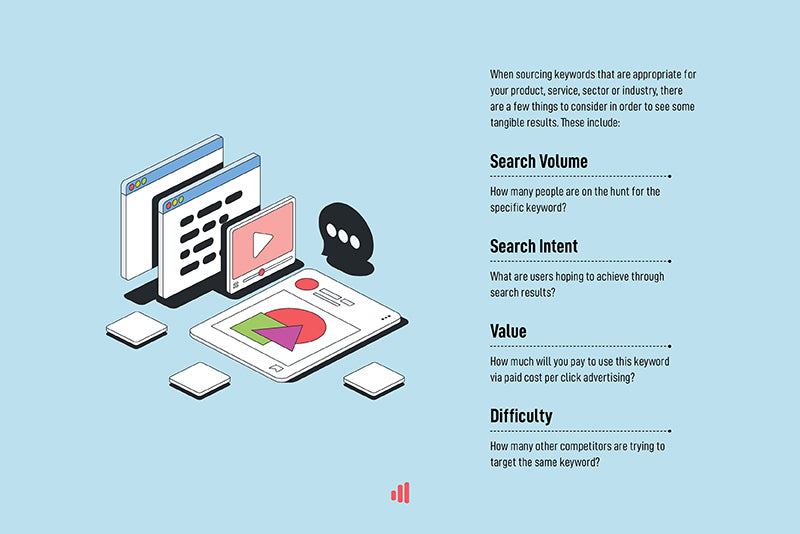What are keywords? How do they work? How do I find some? What do I do with them? Rest assured, you’re not alone if answering these questions leaves you baffled.
The fine art of blogging is paramount when it comes to nailing a successful SEO strategy, and in turn, growing your online presence. Otherwise known as Search Engine Optimisation, SEO is what we call the practice of including specific content on your website that has the potential to improve your visibility on search engines, and in turn their users. Put simply, it helps your site show up more often in relevant searches, and is crucial if you want to reach the lofty heights of the first page on search engines like Bing and Google.

In comparison, keywords are how brands and businesses can attempt to rank for the right search terms – or get seen by the right people online. However, your choice of keywords can have a huge ripple effect on your website, so it’s important to understand how they work if you want to have a decent shot at meeting Google’s SEO guidelines.
In A Nutshell, What Are Keywords?
The function of keywords is that they essentially act as a data driven truth serum. When nobody’s watching, we’re combing the internet for solutions to all kinds of problems, in the hopes that somebody out there has the answers. At its core, research via keywords is a powerful market research tool that can be leveraged in many different ways.
The role of Google and other search engines is to categorise organic content, and to present the user with the most relevant results. If you are able to harness and weaponise the power of SEO (Search Engine Optimisation), you’ll in turn receive a steady flow of regular traffic to your website or platform that’s more or less free of charge – but what you choose to do with said traffic, is entirely up to you.
Got It, But How Do I Find Keywords?
The thing about keywords is that they aren’t exactly delivered to you on a silver platter – you have to go and find the right ones that apply to you. If you pick a keyword that’s too broad, you’ll be competing with thousands of other brands online on a global scale. However, it’s worth noting that even the most obscure phrases can be used to drive traffic to your website if you crunch the numbers and conduct thorough keyword research.
If you’re semi-familiar with this concept, you may have wondered “what are long tail keywords”? Essentially, it’s targeting a phrase instead of a singular word, such as a question. When using voice search as opposed to Google search, the primary point of difference is the types of queries we’re asking. Voice search is usually long form questions, as opposed to the traditional one or two word topic searches that we ask Google. This is when writing to target long tail keywords can really pay off.
Thankfully, there are quite literally thousands of platforms and programs available for marketers, brands and businesses to use in the hopes of finding the keywords to use that best fit their product or service. While many offer a paid subscription model, one of the best options available is the free module that Google itself provides, known as the Google Keyword Planner.
When sourcing keywords that are appropriate for your product, service, sector or industry, there are a few things to consider in order to see some tangible results. These include:
Search Volume – How many people are on the hunt for the specific keyword?
Search Intent – What are users hoping to achieve through search results?
Value – How much will you pay to use this keyword via paid cost per click advertising?
Difficulty – How many other competitors are trying to target the same keyword?

Combining the information provided via the above four factors will help you to determine whether a specific keyword is worth pursuing or not. Stuck for ideas when it comes to your keyword strategy? The good news is that your options are virtually limitless. Think about topics that are trending in the news, targeting a local area in which you do business, or even check out what your competitors are up to. In fact, you should be experimenting with the types and styles of keywords in order to measure what works for you and your brand.
The Key To Good SEO Is Great Content
Producing quality, consistent and on brand content that’s SEO and ultimately Google friendly takes time, effort, experience and resources – and you’re not alone if you can’t quite commit to that. Avoiding the use of content marketing altogether may actually be doing your brand a disservice, but thankfully – investing in a solid strategy has never been easier.
Here at Content Hive, producing top quality digital content is exactly what we do best. We have itemised a list of digital content services, and allocated credits next to each of these. This means that each month, you can use your credits with us to produce digital content such as social media posts, blog articles, videos and even animated Instagram stories.
We believe that this model means we can produce high quality content faster than normal delivery times. It also means that because you have a monthly credit, you are going to want to make sure you use these up – and so do we – meaning that your digital content is always consistent.
If you aren’t quite sure where to start on your digital marketing journey and would like to speak to a professional, why not book a free discovery call with us at Content Hive today to discuss how we can get your brand buzzing online.


